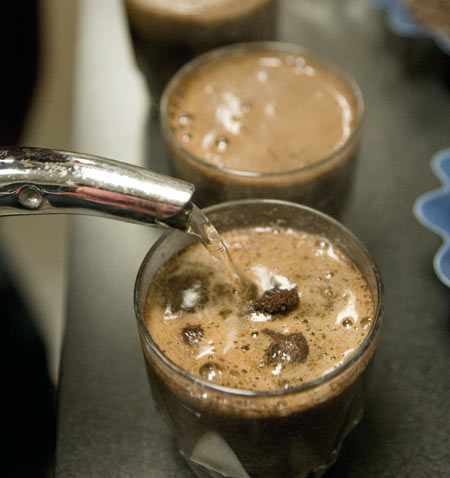 | « Back to article | Print this article |
Coffee prevents diabetes, does NOT up cancer, heart risk
Moderate consumption of coffee -- four to five cups of coffee a day -- may lower the chances of developing type 2 diabetes compared with those drinking it occasionally or not at all, say researchers.
A major European investigation into the effects of diet and lifestyle on health, found a cut in risk of around 30 per cent from regular consumption of coffee -- whether it was caffeinated or decaffeinated.
Click here for Rediff RealTime News on diabetes
Coffee prevents diabetes, does NOT up cancer, heart risk
The findings also reveal that coffee drinking does not appear to increase the risk of heart disease or cancer, the Daily Mail reported.
In total 42,659 people took part in the European Prospective Investigation into Cancer and Nutrition (EPIC) Germany study, and were followed up for almost nine years on average.
Coffee prevents diabetes, does NOT up cancer, heart risk
During that time, there were 1,432 cases of type 2 diabetes diagnosed, 394 heart attacks, 310 strokes cases and 1,801 cancer cases.
Drinking more than four cups of coffee a day -- caffeinated and decaffeinated -- compared with less than one cup was not linked to a higher risk of developing a chronic disease.
Coffee prevents diabetes, does NOT up cancer, heart risk
A lower risk of 20 to 30 per cent of developing type 2 diabetes was linked to moderate consumption of both kinds of coffee.
Although caffeine is known to act as a stimulant, it has been unclear how much a driver needs to keep alert during long journeys.
The latest study, carried out by scientists at Utrecht University in the Netherlands, suggests a single cup of caffeinated coffee is all it takes to boost alertness midway through a four-hour motorway drive.
Coffee prevents diabetes, does NOT up cancer, heart risk
Caffeine acts as a stimulant and is known to combat tiredness during monotonous tasks such as motorway driving.
"This study adds to the growing scientific data that suggests moderate coffee consumption, four to five cups of coffee per day, is safe and does not increase the risk of a range of chronic disease," said Dr Euan Paul, executive director of the British Coffee Association.
"It is particularly encouraging to see that coffee consumption may lower the risk of type II diabetes given that around 90 per cent of all adults in the UK with diabetes have type 2 diabetes," Dr Paul added.
The findings were reported in the American Journal of Clinical Nutrition.




